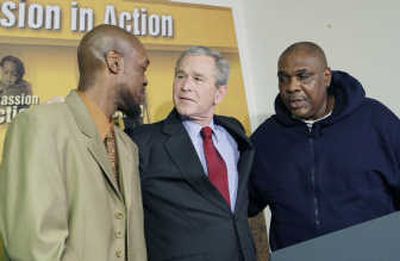Bush opens up about his own booze ‘addiction’

BALTIMORE – President Bush is talking more openly lately about his old drinking habit, and Tuesday he offered perhaps his most pointed assessment yet by saying plainly that the term “addiction” had applied to him.
“Addiction is hard to overcome. As you might remember, I drank too much at one time in my life,” Bush said during a visit to the Jericho Program, a project of Episcopal Community Services of Maryland that helps former prisoners deal with problems such as drug addiction so they can find jobs and reintegrate productively into society.
Bush spoke to reporters after meeting privately with two men who have graduated from Jericho’s program and dealt with drug problems. During that session, which the White House allowed one reporter to attend, Bush spoke frankly about himself.
“I understand addiction, and I understand how a changed heart can help you deal with addiction,” he told the two men. “There’s some kind of commonality.”
He asked Adolphus Mosely and Tom Boyd how they stopped using drugs – and then answered his own question.
“First is to recognize that there is a higher power,” Bush said. “It helped me in my life. It helped me quit drinking.”
“That’s right, there is a higher power,” Mosely said.
“Step One, right?” Bush said, referring to the Alcoholics Anonymous 12-step program. Actually, it is the second step.
When the president spoke publicly, flanked by both men, it was plain that it was a powerful subject for him personally. Bush grew somber and fixed an unbroken gaze on the cameras as he related the similarities between himself and the men in this East Baltimore neighborhood struggling to put their lives back together.
“These are men who were, in some ways, lost, and lonely, and found love and redemption at Jericho,” Bush said. “Proud to be with you.”
He hailed them for now being “reunited with their daughters.” “Girls love their dad, especially a redeemed dad,” said Bush, father of 26-year-old twins Jenna and Barbara.
The 61-year-old president decided to quit drinking the day after a particularly boozy 40th-birthday celebration – July 6, 1986. He has often credited both his Christian faith and vigorous exercise with giving him the discipline he needed.
But when he was first running for president in 2000 and during his earlier years in office, Bush stuck to almost quaint code words when on the topic. He has never said publicly whether he was an alcoholic.
As was typical, Bush said during a November 2000 news conference in which he admitted pleading guilty in 1976 to drunken driving that he merely “occasionally drank too much” as a younger man. He told an interviewer that same year that alcohol “was beginning to compete for my affections” before he quit.
In September 2003, Bush was talking at a Houston community center on the same topic he was on Tuesday – the value of federal support for religious charities that address societal ills. “I know firsthand what it takes to quit drinking, and it takes something other than a textbook or a manual,” he said.
His checkered relationship with booze does come up frequently in his conversations, often as a joke or an aside. Bush is known to have said that the subject is never far from his mind.
Last year, while traveling the country promoting ethanol created from biowaste as an alternative energy source, he’d often find himself in laboratories with beakers full of the alcohol-based substance. At a North Carolina plant, Bush held a container up to his nose for a mock sniff and then shook his head at the bemused reaction from his press corps. “I quit drinking in 1986,” he said, laughing.
John Schwarzlose, head of the Rancho Mirage, Calif.-based Betty Ford Center, a substance abuse treatment hospital, said Bush’s new openness might well be inspirational to some. But he said that was far overshadowed by his disappointment that Bush had missed opportunities as a leader and policymaker to aggressively tackle the root issues.